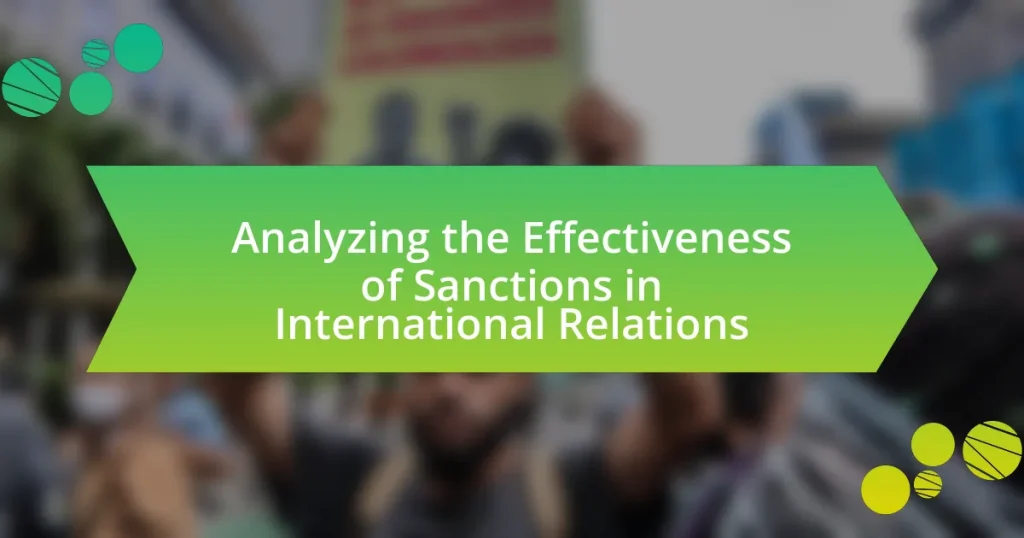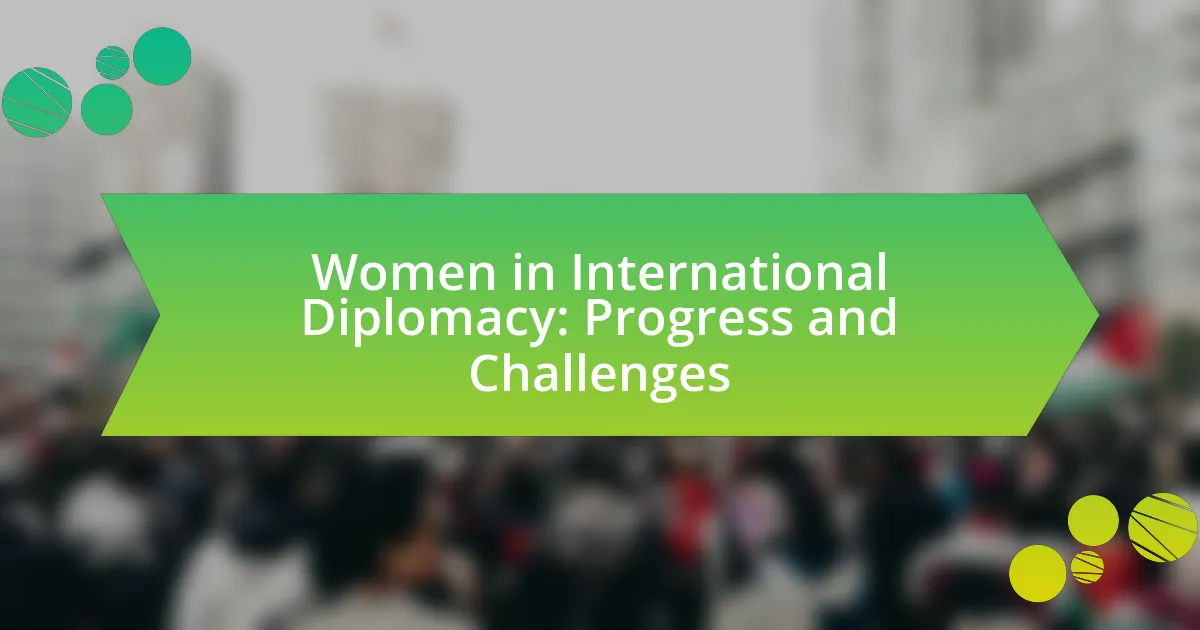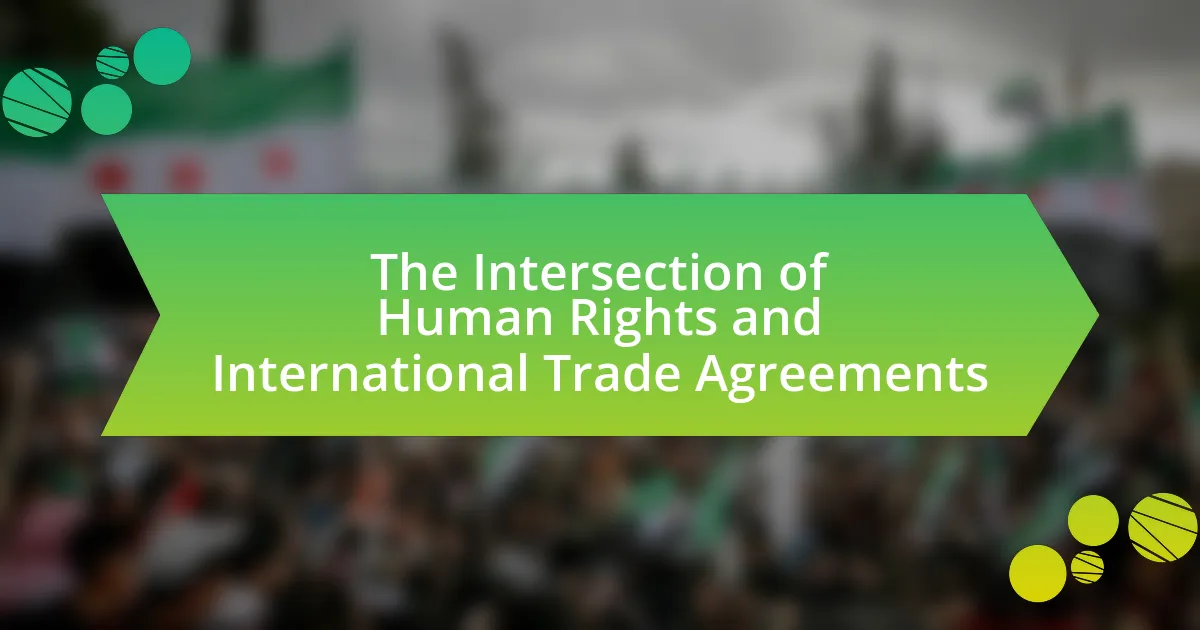Sanctions in international relations are coercive measures imposed by countries or international organizations to influence the behavior of targeted states or entities, encompassing economic restrictions, trade barriers, travel bans, and diplomatic isolation. This article analyzes the effectiveness of sanctions, exploring their functions in global politics, types commonly used, and the implementation processes by nations. It examines the objectives behind sanctions, their impact on targeted nations, and the factors influencing their effectiveness, including political contexts and international support. Additionally, the article discusses the consequences of sanctions on global relations, trade dynamics, and potential alternatives to sanctions, emphasizing the importance of diplomatic engagement and economic incentives in conflict resolution.
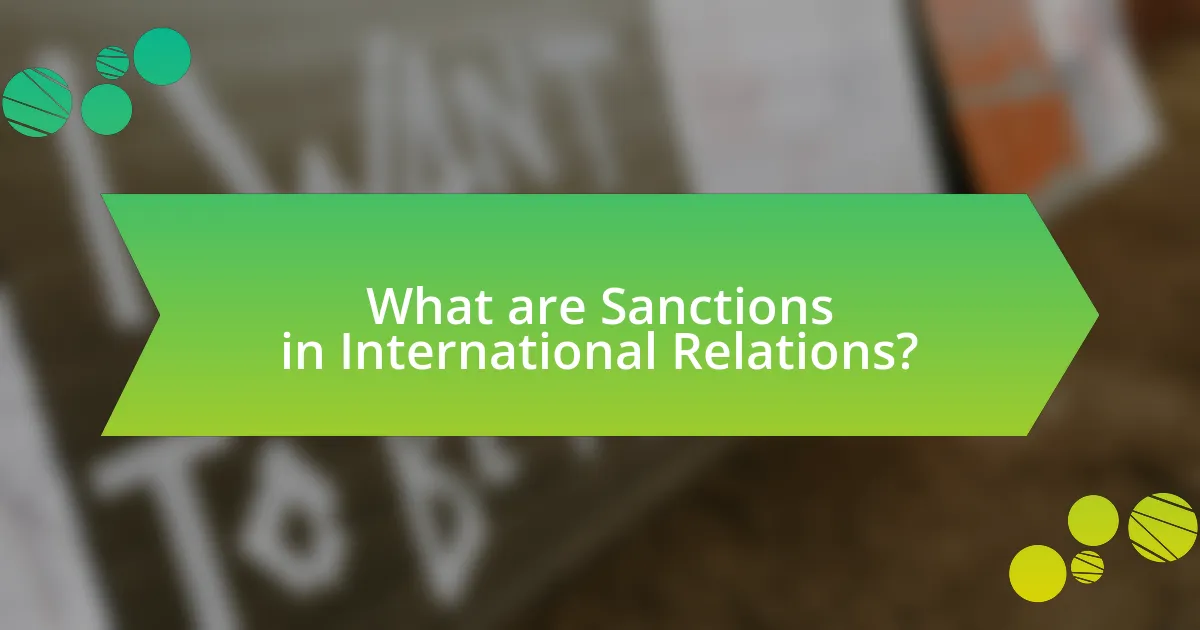
What are Sanctions in International Relations?
Sanctions in international relations are coercive measures imposed by countries or international organizations to influence the behavior of a target state or entity. These measures can include economic restrictions, trade barriers, travel bans, and diplomatic isolation, aimed at compelling compliance with international laws or norms. For instance, the United Nations has implemented sanctions against North Korea to deter its nuclear weapons program, demonstrating how sanctions serve as a tool for enforcing international security and policy objectives.
How do Sanctions Function in Global Politics?
Sanctions function in global politics as tools used by countries or international organizations to influence the behavior of states or entities that violate international norms or threaten global security. They can take various forms, including economic sanctions, trade restrictions, and diplomatic measures, aimed at compelling compliance or punishing undesirable actions. For example, the United Nations imposed sanctions on Iraq in the 1990s to respond to its invasion of Kuwait, which significantly impacted Iraq’s economy and political landscape. These measures are designed to create economic pressure, isolate the targeted entity, and signal disapproval from the international community, thereby aiming to alter the target’s behavior.
What Types of Sanctions are Commonly Used?
Commonly used sanctions include economic sanctions, diplomatic sanctions, military sanctions, and travel bans. Economic sanctions restrict trade and financial transactions, often targeting specific sectors or entities to exert pressure on a country. Diplomatic sanctions involve the reduction or severance of diplomatic ties, such as expelling diplomats or limiting diplomatic engagements. Military sanctions may include arms embargoes or restrictions on military cooperation. Travel bans prevent individuals, often government officials or business leaders, from entering certain countries. These types of sanctions are frequently employed by countries or international organizations to influence behavior and achieve foreign policy objectives.
How are Sanctions Implemented by Nations?
Sanctions are implemented by nations through legal frameworks, diplomatic channels, and enforcement mechanisms. Nations typically enact sanctions by passing legislation or issuing executive orders that specify the targeted entities, such as countries, organizations, or individuals, and the nature of the restrictions, which can include trade embargoes, asset freezes, or travel bans. For instance, the United States employs the Office of Foreign Assets Control (OFAC) to administer and enforce economic sanctions, which are often based on national security interests or foreign policy objectives. The effectiveness of these sanctions is monitored through compliance checks and international cooperation, as seen in the United Nations’ sanctions regimes that require member states to report on their implementation efforts.
Why are Sanctions Imposed?
Sanctions are imposed primarily to influence the behavior of a state or entity that is perceived to violate international norms or laws. Governments and international organizations utilize sanctions as a tool to compel compliance, deter undesirable actions, or punish transgressions, such as human rights abuses, aggression, or nuclear proliferation. For instance, the United Nations imposed sanctions on North Korea in response to its nuclear weapons program, aiming to pressure the regime into denuclearization. This approach is supported by historical evidence showing that sanctions can lead to changes in policy or behavior, although their effectiveness can vary based on the context and the targeted entity’s resilience.
What Objectives Do Sanctions Aim to Achieve?
Sanctions aim to achieve several key objectives, primarily to coerce a change in behavior, deter future actions, and signal disapproval of specific actions by a state or entity. These measures are often employed to influence a target’s policies, particularly in areas such as human rights violations, nuclear proliferation, or aggression against other nations. For instance, economic sanctions can restrict access to financial markets and resources, thereby pressuring the target to comply with international norms. Historical examples include the sanctions imposed on South Africa during the apartheid era, which aimed to dismantle the oppressive regime by isolating it economically and politically.
How Do Sanctions Affect Targeted Nations?
Sanctions negatively impact targeted nations by restricting their economic activities and access to international markets. These measures can lead to decreased GDP, increased inflation, and shortages of essential goods, as seen in countries like Iran and Venezuela, where sanctions have resulted in significant economic downturns and humanitarian crises. For instance, after the imposition of sanctions in 2012, Iran’s economy contracted by approximately 6.6% in 2013, demonstrating the tangible effects of such restrictions on national economies.

What Factors Influence the Effectiveness of Sanctions?
The effectiveness of sanctions is influenced by several key factors, including the type of sanctions imposed, the targeted country’s economic resilience, the level of international support, and the clarity of the sanctions’ objectives. For instance, comprehensive economic sanctions tend to be more effective than targeted sanctions when the goal is to induce significant policy changes, as seen in the case of Iran’s nuclear program, where extensive sanctions led to negotiations. Additionally, a country’s ability to withstand economic pressure, such as Russia’s adaptation to Western sanctions through alternative trade partnerships, can diminish the impact of sanctions. International support is crucial; sanctions that are widely endorsed by multiple countries, like those imposed on North Korea, tend to be more effective due to increased isolation. Lastly, clearly defined objectives help in measuring success and maintaining international consensus, as evidenced by the sanctions against South Africa during apartheid, which were aimed at specific political changes.
How Do Political Contexts Impact Sanction Outcomes?
Political contexts significantly influence sanction outcomes by shaping the motivations and responses of targeted states. For instance, sanctions imposed during a period of political instability may lead to increased nationalism and resistance among the targeted population, thereby undermining the intended effects. Historical examples, such as the sanctions against Iraq in the 1990s, demonstrate that political contexts, including domestic governance and international alliances, can either bolster or weaken the efficacy of sanctions. Additionally, research by Hufbauer et al. (2009) in “Economic Sanctions Reconsidered” indicates that sanctions are more likely to succeed when the targeted country is politically isolated and lacks strong allies, highlighting the critical role of the political landscape in determining sanction effectiveness.
What Role Does International Support Play?
International support plays a crucial role in the effectiveness of sanctions in international relations by enhancing their legitimacy and impact. When multiple countries or international organizations unite to impose sanctions, it signals a collective stance against a particular behavior, increasing the pressure on the targeted state. For instance, the coordinated sanctions against Iran by the United States, European Union, and United Nations significantly weakened its economy and pushed it towards negotiations regarding its nuclear program. This demonstrates that international support not only amplifies the economic consequences of sanctions but also fosters diplomatic avenues for resolution.
How Do Domestic Conditions in Targeted Nations Affect Sanctions?
Domestic conditions in targeted nations significantly influence the effectiveness of sanctions. When a nation experiences political instability, economic hardship, or social unrest, the impact of sanctions can be amplified, as these conditions may exacerbate the population’s suffering and lead to increased anti-government sentiment. For instance, in countries like Venezuela, where economic mismanagement and political repression are prevalent, sanctions have intensified existing crises, leading to greater public discontent against the ruling regime. Conversely, if a targeted nation has strong internal cohesion and support for its government, sanctions may be less effective, as the leadership can rally nationalistic sentiments against perceived external threats. Historical examples, such as North Korea, demonstrate that despite severe sanctions, domestic conditions can enable the regime to maintain control and even strengthen its resolve against external pressures.
What Metrics are Used to Assess Sanction Effectiveness?
Metrics used to assess sanction effectiveness include economic indicators, compliance rates, and political outcomes. Economic indicators, such as GDP growth, trade volume, and inflation rates, provide quantitative measures of the sanctions’ impact on the targeted country’s economy. Compliance rates reflect how well the sanctioned entity adheres to the terms set by the sanctions, often measured through changes in behavior or policy. Political outcomes assess shifts in governance, such as changes in leadership or policy reforms, which can indicate whether sanctions have achieved their intended political objectives. These metrics are essential for evaluating the overall success and impact of sanctions in international relations.
How is Compliance Measured?
Compliance is measured through various quantitative and qualitative metrics, including adherence to legal frameworks, implementation of policy changes, and observable behavioral shifts in targeted entities. For instance, in the context of international sanctions, compliance can be assessed by monitoring trade patterns, financial transactions, and diplomatic engagements that align with or violate imposed restrictions. Studies, such as those conducted by the United Nations, often utilize data analytics to evaluate the effectiveness of sanctions by comparing pre- and post-sanction behaviors of nations or organizations, providing concrete evidence of compliance levels.
What Indicators Reflect the Success or Failure of Sanctions?
Indicators that reflect the success or failure of sanctions include changes in the targeted country’s economic performance, shifts in political behavior, and alterations in international relations. Economic indicators such as GDP contraction, inflation rates, and trade volume reductions often signal the impact of sanctions. For instance, after the imposition of sanctions on Iran in 2012, its GDP shrank by approximately 6.6% in 2013, illustrating economic distress. Political behavior can be assessed through changes in leadership decisions or compliance with international demands, as seen when North Korea engaged in negotiations following sanctions. Additionally, the response of allies and adversaries in the international community can indicate the effectiveness of sanctions; for example, the European Union’s unified stance on sanctions against Russia post-2014 demonstrated a collective response that reinforced the sanctions’ impact.
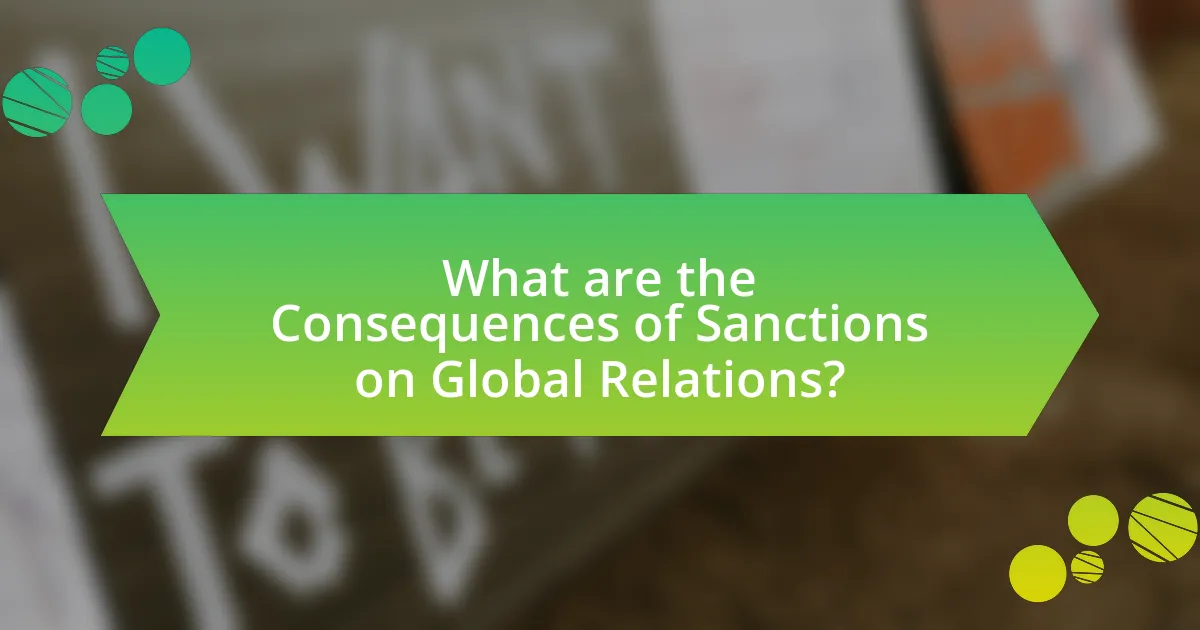
What are the Consequences of Sanctions on Global Relations?
Sanctions significantly alter global relations by creating economic and political rifts between nations. These measures often lead to strained diplomatic ties, as countries imposing sanctions may face retaliation or increased hostility from the targeted nation. For instance, the sanctions imposed on Russia following its annexation of Crimea in 2014 resulted in a deterioration of relations between Russia and Western nations, leading to a more polarized international environment. Additionally, sanctions can push affected countries to seek alliances with non-sanctioning states, thereby reshaping geopolitical dynamics. The long-term consequences include potential shifts in trade patterns and the emergence of new power blocs, as seen with countries like Iran strengthening ties with China and Russia in response to Western sanctions.
How Do Sanctions Affect Diplomatic Relations?
Sanctions significantly strain diplomatic relations by creating barriers to communication and cooperation between nations. When one country imposes sanctions on another, it often leads to a breakdown in dialogue, as the targeted nation may perceive the sanctions as hostile actions. For instance, the United States’ sanctions against Iran have resulted in diminished diplomatic engagement, as both countries have reduced their interactions and negotiations over issues such as nuclear proliferation. This deterioration in relations can hinder conflict resolution and exacerbate tensions, making it challenging to achieve diplomatic solutions.
What Long-term Impacts Can Sanctions Have on Alliances?
Sanctions can lead to long-term impacts on alliances by straining relationships between countries and altering their strategic alignments. For instance, when the United States imposed sanctions on Iran, it not only affected U.S.-Iran relations but also pushed Iran closer to countries like Russia and China, thereby reshaping regional alliances. Additionally, sanctions can create economic hardships that may lead to domestic instability, prompting allied nations to reconsider their support or cooperation with the sanctioning country. Historical examples, such as the sanctions against Iraq in the 1990s, illustrate how prolonged economic pressure can drive nations to seek alternative partnerships, ultimately weakening existing alliances.
How Do Sanctions Influence Global Trade Dynamics?
Sanctions significantly alter global trade dynamics by restricting the economic activities of targeted nations, thereby affecting their trade relationships and market access. For instance, when the United States imposed sanctions on Iran, it led to a dramatic decline in Iran’s oil exports, which fell from 2.5 million barrels per day in 2017 to approximately 300,000 barrels per day by 2020. This reduction not only impacted Iran’s economy but also shifted global oil supply chains, as countries like Saudi Arabia and Russia adjusted their production levels to fill the gap. Furthermore, sanctions can lead to the formation of alternative trade networks, as countries seek to bypass restrictions, exemplified by China’s increased trade with sanctioned nations. These shifts illustrate how sanctions can reshape trade flows, influence pricing, and create new economic alliances, ultimately altering the landscape of global commerce.
What Alternatives to Sanctions Exist in International Relations?
Diplomatic engagement serves as a primary alternative to sanctions in international relations. This approach involves negotiations and dialogue between states to resolve conflicts and address grievances without resorting to punitive measures. Historical examples include the Camp David Accords in 1978, where the United States facilitated negotiations between Egypt and Israel, leading to a peace treaty that avoided military confrontation. Additionally, economic incentives, such as trade agreements or development aid, can encourage compliance with international norms and foster cooperation, as seen in the European Union’s approach to Eastern European countries. These alternatives can promote stability and constructive relationships, often yielding more sustainable outcomes than sanctions.
How Effective are Diplomatic Solutions Compared to Sanctions?
Diplomatic solutions are generally more effective than sanctions in achieving long-term conflict resolution and fostering cooperation among nations. Historical evidence shows that negotiations, such as the 2015 Iran nuclear deal, led to significant reductions in nuclear proliferation risks, while sanctions often result in economic hardship without achieving desired political outcomes. For instance, the United Nations sanctions on North Korea have not successfully curtailed its nuclear ambitions, indicating that sanctions can sometimes entrench adversarial positions rather than promote dialogue.
What Role Do Economic Incentives Play in Conflict Resolution?
Economic incentives play a crucial role in conflict resolution by providing tangible benefits that encourage parties to negotiate and reach agreements. These incentives can take the form of financial aid, trade agreements, or the lifting of sanctions, which can motivate conflicting parties to alter their behavior and seek peaceful solutions. For instance, the 2015 Iran nuclear deal exemplifies how economic incentives, such as the promise of sanctions relief, facilitated negotiations and led to a significant reduction in nuclear tensions. This demonstrates that when economic benefits are aligned with diplomatic efforts, they can effectively contribute to resolving conflicts.
What Best Practices Should Be Considered When Implementing Sanctions?
When implementing sanctions, best practices include clearly defining the objectives, ensuring legal compliance, and maintaining international cooperation. Clearly defined objectives help in measuring the effectiveness of sanctions, as seen in the case of the United Nations sanctions on Iraq, which aimed to disarm and prevent the development of weapons of mass destruction. Legal compliance is crucial to avoid unintended consequences and ensure legitimacy; for instance, the European Union’s sanctions against Russia were carefully crafted to align with international law. Lastly, maintaining international cooperation enhances the impact of sanctions, as demonstrated by the coordinated sanctions against North Korea, which involved multiple countries working together to enforce restrictions effectively.
